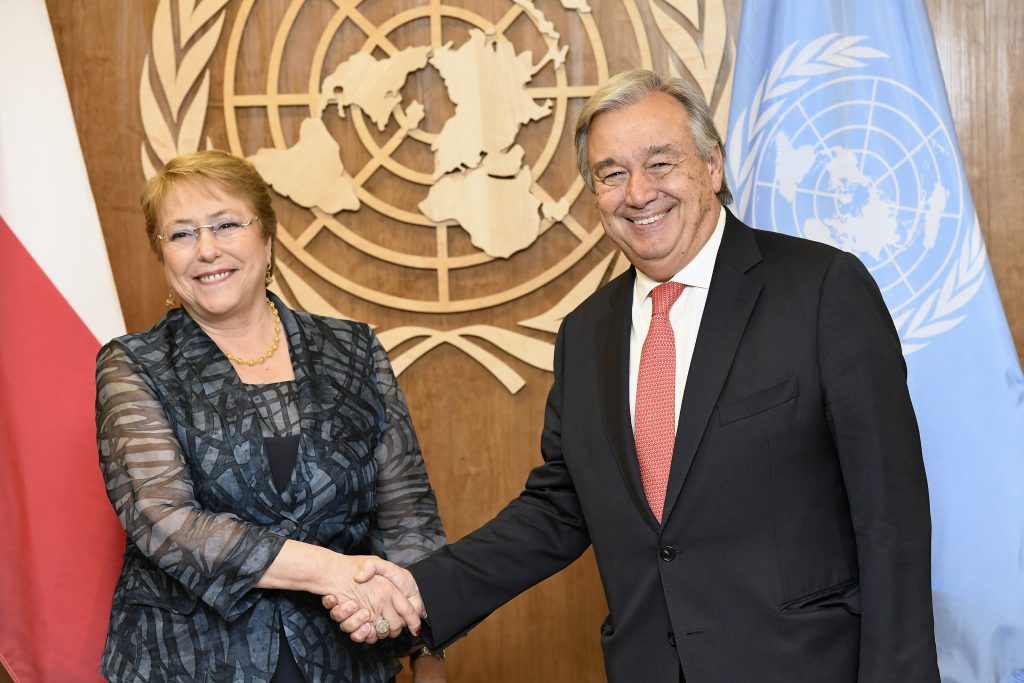FRESH AIR
Could Bachelet and Bishop help reform the UN Human Rights Council?
August 17, 2018 | Naomi Levin

The newly appointed United Nations High Commissioner for Human Rights is a Companion of the Order of Australia and led a government described by the Israeli media as “the most Jewish government in the world” outside of Israel. She also has a challenge on her hands.
Michelle Bachelet is the new commissioner of a body that has failed to consistently address the worst global human rights abuses, while spending a disproportionate amount of its time attacking Israel. However, given her links to Australia and her apparently open mind on Israel and the Palestinians, Australia and its diplomats could have a role to play in encouraging her to help rid the Human Rights Council of its longstanding anti-Israel biases.
Bachelet is a former president of Chile and a former leader of UN Women. She also has personal links to Australia, which currently holds a seat on the UN Human Rights Council. Bachelet takes over from Zeid Ra’ad Al Hussein, who has stood aside after four controversial years in the position.
Chile’s first female head of state has personal experience of being denied human rights, having herself suffered torture and political imprisonment. In the mid-1970s, she was a political prisoner under Augusto Pinochet’s dictatorship. While she survived with her mother, her father died in prison.
She also has an unlikely connection to Australia. Immediately following her release from Chilean prison, Bachelet and her mother fled to Sydney, where her brother lived. They stayed in Australia for five months.
In 2009, her government was the first in Latin America to sign a free trade agreement with Australia, and in 2012, she was awarded an honorary Companion of the Order of Australia by then governor-general Quentin Bryce for promoting Australia-Chile relations and assisting with women’s empowerment.
Bachelet, the leader of Chile’s Socialist Party, served as president from 2006-2010 and again from 2014-2018. Following her first presidential election, Israeli online news agency Ynet noted Chile had “the most Jewish government in the world” after Israel, with Bachelet appointing three Jewish ministers and one Jewish deputy minister.
At the same time, Bachelet was also leader of a country that is home to the largest Palestinian population outside the Arab world.
So what sort of UN High Commissioner for Human Rights will Bachelet be, particularly when it comes to controversial item seven on the Commission’s standing agenda: “Human rights situation in Palestine and other occupied Arab territories”?
During her time as Chilean president, Bachelet was not preoccupied with Israel and the two countries did not enjoy significant relations. Her government, however, did join with other Latin American countries in recalling their ambassadors from Israel during Operation Protective Edge in 2014.
Friends of Israel have not provided extensive commentary on Bachelet’s appointment, however both Israel and the United States have called on Bachelet to do better than her predecessor Zeid.
Earlier this year, the US withdrew from the Human Rights Council over its failure to address its many shortcomings. Nevertheless, Stefanie Amadeo from the US mission to the UN said of Bachelet’s appointment: “The UN system has failed to adequately address major human rights crises in Iran, North Korea, Democratic Republic of the Congo, and elsewhere, or stop its chronic, disproportionate obsession with Israel. It is up to Ms Bachelet to speak out against these failures rather than accept the status quo. We hope that she does. The United States will.”
In his statement, Israeli Ambassador to the UN Danny Danon referred instead to Bachelet’s predecessor, Jordanian diplomat and member of the Hashemite royal family, Zeid Ra’ad Al Hussein.
“From many of his statements, you would be forgiven for thinking he considered Hamas a welfare, not a terrorist, organization. During his tenure, the [UN Human Rights Council] became a theater of the absurd, with hypocrisy and double standards rampant among its proceedings and reports,” Danon said.
Australia’s Permanent Mission in Geneva, where the Human Rights Council is located, released a brief statement marking Bachelet’s appointment: “Australia warmly welcomes the appointment of Dr Michelle Bachelet as the new UN High Commissioner for Human Rights. We look forward to working with Dr Bachelet as a member of the Human Rights Council to support the HRC to carry out its role.”
UN Watch, the Geneva-based non-government organisation which has long called out the UN for its anti-Israel bias, focused instead on Bachelet’s record in appeasing serial human rights abusers Cuba and Venezuela.
Given Bachelet’s long-standing ties to Australia, coupled with Australia’s determination, as expressed by Foreign Minister Julie Bishop, to “progress effective and meaningful reform” in the Council and Australia’s ongoing concern about its “anti-Israel bias”, there may be a chance to influence the controversial body for the better.
The UN Human Rights Council meets again from September 10 and the agenda is already set. Item seven is scheduled for discussion on September 24.
It is not too late to hope though, that under Bachelet’s presidency, this item will be abolished and the focus return to the people suffering under despotic regimes, rather than those living in a democracy with the offer of ongoing peace perpetually on the table. It would be a major achievement for Australia’s term of membership of the Council, and a fulfillment of our self-declared aims for that membership, if it was able to work with Bachelet toward this aim.
RELATED ARTICLES

US Middle East strategy amid regional instability: Dana Stroul at the Sydney Institute

Antisemitism in Australia after the Bondi Massacre: Arsen Ostrovsky at the Sydney Institute





















